In my last post I reviewed some water-based vitamin C serums containing ascorbic acid (Paula’s Choice, Ultraceuticals and Ausceuticals). Today, I’m looking at some oil-based serums containing a slightly modified version of vitamin C: ascorbyl isotetrapalmitate.
There are a few reasons to use a modified version of ascorbic acid (vitamin C) instead of the real thing. Since ascorbic acid isn’t soluble in oil, it can’t be the main form of vitamin C used in an oil-based product. Instead, oil-based bits are added to the structure of ascorbic acid to make it mix well with oil. This usually results in chemicals called vitamin C esters. The most popular ones are ascorbyl tetraisopalmitate (also known as tetraisopalmitoyl ascorbic acid or ATIP), tetrahexyldecyl ascorbate (THDA, which seems to be the same molecule with a different name) and ascorbyl palmitate.
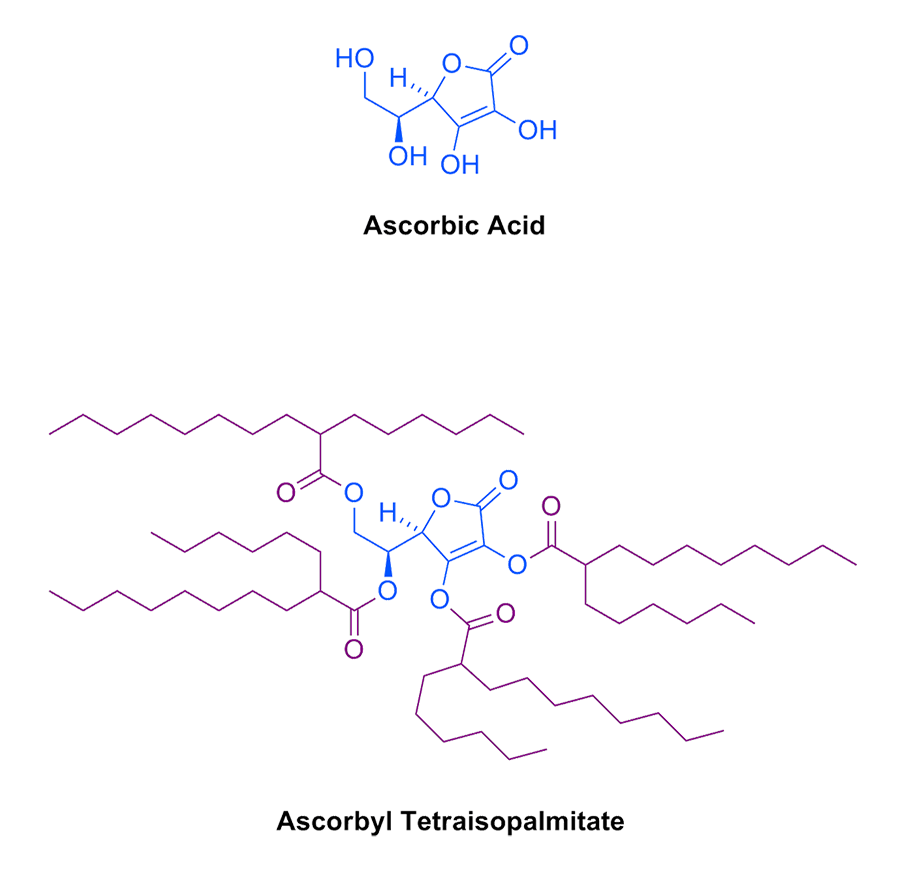
The advantage of using an oil-soluble vitamin C derivative is that it penetrates the skin more easily than water-soluble ascorbic acid. The advantage of using any vitamin C derivative, both water- and oil-soluble, is that they’re a lot more stable than unaltered ascorbic acid. For example, ascorbyl tetraisopalmitate has a shelf life of over a year compared with a few weeks or months for ascorbic acid. The downside for all these derivatives is that they need to be broken back down to ascorbic acid to have its full antioxidant, collagen-boosting effect on your skin, and this isn’t always efficient. For vitamin C esters, the enzyme cytosolic esterase is responsible for this conversion. Additionally, many of these esters aren’t very well studied, so their effectiveness is less certain.
Ascorbyl tetraisopalmitate is the most popular oil-soluble vitamin C, and while there aren’t many studies on it yet, it seems that it does convert to vitamin C in the skin, and help with UVA and UVB damage (possibly via an antioxidative effect). Here are some products containing ascorbyl tetraisopalmitate that I’ve tried out:
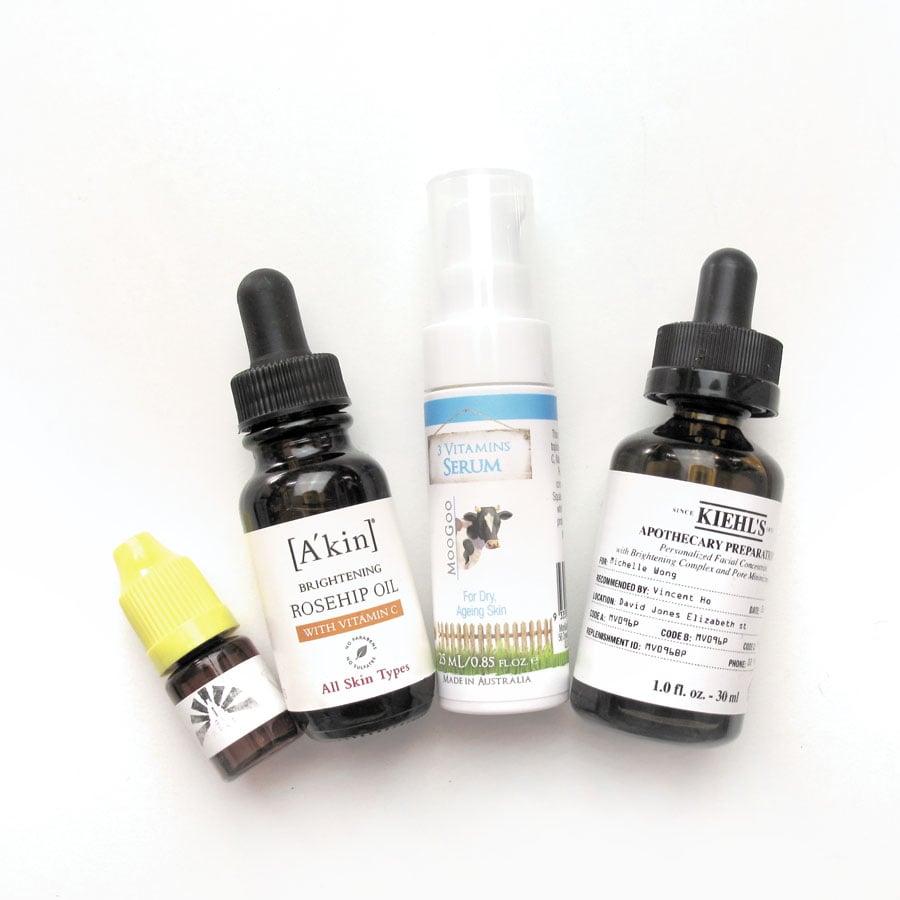
MooGoo 3 Vitamins Serum
Australian natural skincare brand MooGoo have two ascorbyl tetraisopalmitate serums: 3 Vitamins Serum ($24.90 for 25 mL) which contains an unspecified amount of ATIP, and Super Vitamin C Serum ($34.90 for 25 mL) which contains a whopping 25% ATIP (I love it when companies make it easy to find percentages!)
I’ve only tried the 3 Vitamins Serum. Apart from ascorbyl tetraisopalmitate, the other two vitamins are natural vitamin E and panthenol, which can turn into vitamin B5 in the body (pro-vitamin B5). Vitamin E works in tandem with vitamin C to give a stronger antioxidant effect, while vitamin B5 can potentially act as an anti-inflammatory and promote skin repair. The base of the serum is jojoba, squalane and olive oil decyl esters, which are all skin-conditioning emollients.
My skin responded well to this, and it gave a nice smooth look to my skin the next day. However, the brightening effect wasn’t as strong as with other vitamin C serums, probably because it contains less vitamin C. It comes in a handy pump bottle. The things I didn’t like were the smell (it smells like soy sauce at first, though the odour goes away quickly) and the stickiness it left (probably the panthenol – it’s a humectant). The product also separated a bit – again, I’m blaming the panthenol.
Ingredients: Simmondsia Chinensis (Jojoba) Seed Oil, Squalane, Olive Oil Decyl Esters, Ascorbyl Tetraisopalmitate, Tocopherol, Panthenol.
Kiehl’s Apothecary Preparation with Brightening and Pore Minimising Complex
Kiehl’s Apothecary Preparations ($140 for 20 mL + 2 x 5 mL = 30 mL) is an interesting concept. A Kiehl’s consultant assesses your skin with you and you come up with your 2 key skin concerns that you’d like to target (out of 5). You get 2 tubes of “complex” tailored to your concerns, and a dropper vial containing the base (“skin strengthening concentrate”). Once you get home, you squeeze the complexes into the base, give the bottle a shake and you’re ready to go! It’s a really clever way for Kiehl’s to stock 10 different serums without making the decision difficult for customers – picking 2 concerns is a much less stressful task than trying to understand 10 serums so you can work out which one is best for you.
Unsurprisingly, I was given two complexes containing ascorbyl tetraisopalmitate as the second ingredient (Brightening and Pore Minimising), since vitamin C is going to solve all my skin problems. (The other complexes available are Visible Redness Neutralising, Wrinkle Reducing and Texture Refining – I have no idea whether vitamin C are in those as I can’t find the ingredients lists online.) The Brightening Complex also includes scotch pine extract, which is where the much-hyped pigmentation-fading ingredient SymWhite 377 comes from (unfortunately no independent studies available). Pore Minimising Complex has the featured ingredients salicylic acid and samphira (Crithmum Maritimum or sea fennel) extract, which again is hyped for pore clearing though there aren’t any independent studies (it’s used in some pore-clearing products from Phytocéane and ZO Skin Health).
The finished serum feels very luxe and spreads really well on skin, thanks to squalane being the top ingredient in all three components. It’s very nicely skin-smoothing. However, it’s impossible to tell how much vitamin C is in this product – you can usually get a very rough estimate with a straightforward ingredients list, but with all the mixing and separate components it’s impossible. It’s also on the pricey side. I think this is a great product if you’re lazy and want one serum that targets your skin concerns without thinking too much about active ingredients and layering, but if you’re a hardcore skincare nerd you’ll probably prefer a more straightforward vitamin C serum.
Skin Strengthening Concentrate Ingredients: Squalane, Octyldodecanol, Dicaprylyl Ether, Prunus Armeniaca Kernel Oil/Apricot Kernel Oil, Coriandrum Sativum Seed Oil/Coriander Seed Oil, Hexyldecanol, Ribes Nigrum Seed Oil/Black Currant Seed Oil, Echium Plantagineum Seed Oil, Tocopherol, Glycine Soja Oil/Soybean Oil, Ascorbyl Palmitate.
Brightening Complex Ingredients: Squalane, Ascorbyl Tetraisopalmitate, Prunus Armeniaca Kernel Oil/Apricot Kernel Oil, Coriandrum Sativum Seed Oil/Coriander Seed Oil, Octyldodecanol, Phenylethyl Resorcinol, Hexyldecanol, Citrus Aurantium Dulcis (Orange) Peel Oil, Limonene, Ribes Nigrum Seed Oil/Black Currant Seed Oil, Echium Plantagineum Seed Oil, Tocopherol, Capryloyl Salicylic Acid, Glycine Soja Oil/Soybean Oil, Linalool, Citral, Ascorbyl Palmitate, Geraniol.
Pore Minimising Complex Ingredients: Squalane, Ascorbyl Tetraisopalmitate, Prunus Armeniaca Kernel Oil/Apricot Kernel Oil, Coriandrum Sativum Seed Oil/Coriander Seed Oil, Octyldodecanol, Caprylic/Capric Triglyceride, Hexyldecanol, Anthemis Nobilis Flower Oil, Salicylic Acid, Ribes Nigrum Seed Oil/Black Currant Seed Oil, Echium Plantagineum Seed Oil, Tocopherol, Capryloyl Salicylic Acid, Crithmum Maritimum Extract, Glycine Soja Oil/Soybean Oil, Limonene, Linalool, Ascorbyl Palmitate.
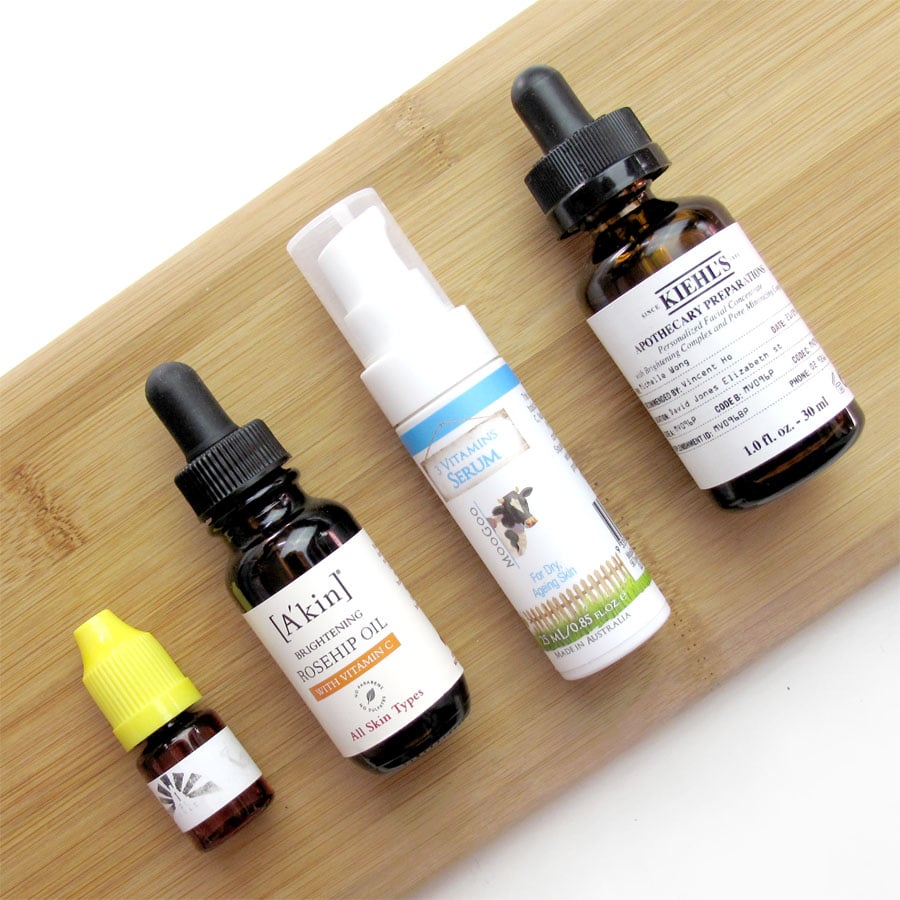
A’kin Brightening Rosehip Oil with Vitamin C
A’kin’s rosehip oil was the first rosehip oil I ever tried – I was immediately hooked! A’kin Brightening Rosehip Oil with Vitamin C ($29.95 for 20 mL) comes with added macadamia oil and ascorbyl tetraisopalmitate, and there’s also rosemary extract as a preservative.
The oil blend still has the familiar musty smell of rose hip oil, but the colour is a bit lighter and the texture is a bit richer (I’m guessing this is from the macadamia oil). It sinks into the skin nicely, giving an instant glow. I can see the brightening overnight, but this product doesn’t give me the same pore-disappearing, blackhead-clearing effect as their regular rosehip oil – I don’t think my skin plays well with oleic-rich oils like macadamia, which would suit people with dry skin more. I’m also curious about the percentage of ascorbyl tetraisopalmitate in this product – from the placing in the ingredients list, it could be anywhere from 1% to 33%…
Ingredients: Rosa canina (Rosehip) Seed Extract, Macadamia ternifolia Seed Oil, Ascorbyl Tetraisopalmitate, Rosmarinus officinalis (Rosemary) Leaf Extract.
Holy Snails El Dorado Vitamin C Oil Serum
Holy Snails is a cult indie skincare brand run by a lady called Chels who bases her formulations on science-backed ingredients (though she includes some fun hyped ingredients too). El Dorado Vitamin C Oil Serum ($45 USD for 30 mL) contains 7% ascorbyl tetraisopalmitate in a base of avocado and jojoba oils. It has 1% vitamin E for the extra antioxidant boost, and fun, interesting-but-not-very-substantiated extracts from desert plants like prickly pear, agave, yucca root and more (I believe this is the blend used if you want to read about more of the potential benefits).
This serum has a rich oil texture that sinks into the skin quickly, and smells faintly like vegetable oil. While my skin was very plump and hydrated when I was using this serum, I didn’t see much difference in my hyperpigmentation – I’m thinking that 7% might not be enough to make a difference for me, given my usual routine and how prone to hyperpigmentation I am.
My only complaint about Holy Snails is the same as for all other US brands when I’m purchasing from Australia – exchange rate, postage speed and cost (though the last one is pretty reasonable – $5.50 USD for First Class). I do have a sample sized of the infamous Shark Sauce on my to-try list that I’m quite excited about!
Ingredients: Avocado Oil, Jojoba Oil, Tetrahexyldecyl Ascorbate, Prickly Pear Extract, (Ethylhexyl Palmitate & Oenothera Biennis (Evening Primrose) Root Extract & Abronia Villosa Leaf Extract & Agave Americana Stem Extract & Yucca Brevifolia Root Extract & Opuntia Coccinellifera Flower Extract & Fouqueria Splendens Stem Extract & Larrea Tridentata Extract), Tocopherol.
Should you pick an oil-based or water-based vitamin C serum?
To be honest, it’s very difficult to say based on the science alone. On one hand, the stability of oil-based serums are much higher than water-based, but it’s easier to tell if a water-based vitamin C serum has been formulated effectively (though whether it’s still effective by the time you put it on your face is questionable). In my opinion, it really comes down to where you can fit vitamin C into your routine – if you’re using a lot of acids already and your skin is sensitive, you might not be able to fit another low pH product into your routine without unnecessary irritation and an oil will work better. On the other hand, if you’re using it during the day and wearing sunscreen, an oil serum might smudge your sunscreen or make it slip off your skin faster during the day, so a water-based serum will fit in better. Personally, I’ll be double-fisting the vitamin C by layering oils over water-based serums so I can finish these products before they all go off!
Kiehl’s, Moogoo and A’kin products were provided for editorial consideration, which did not affect my opinion. This post also contains affiliate links – if you decide to click through and support Lab Muffin financially (at no extra cost to you), thank you! For more information, see Disclosure Policy.


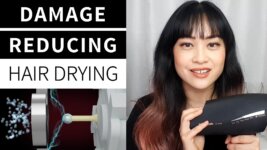
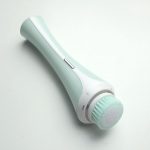
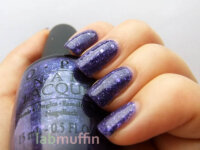
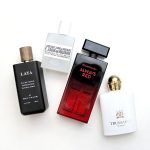
Hey, Michelle! Great post. You have a way better understanding of chemistry than I do, so I’m curious about your thoughts on ascorbic acid serums that include oil.
I know you said, “ascorbic acid isn’t soluble in oil, it can’t be the main form of vitamin C used in an oil-based product,” which I found interesting because I’ve been eying the Drunk Elephant C-Firma day serum for a while. Just haven’t been able to rationalize dropping the cash on it. :p Haha
Anyhow, it includes Marula Oil in its formula. Any thoughts?
Hi! From the ingredients list, it looks like a water-based product that contains a small amount of oil, emulsified with laureth-23. It’s essentially a very watery lotion. The ascorbic acid would be dissolved in the water base, while the oil hangs out in suspended droplets with the oil soluble ingredients (e.g. tocopherol).
Zayum gurl, hit me with that knowledge! Haha awesome. Thanks for the response. Really appreciate it! :-))
No worries! Keep up the good work on your blog! 😉
Hey, thanks! 😀
Hi Michelle,
Do you have a pick for the oil based serums. If you do I think I’ll be following it.
Thanks.
Honestly – it really depends on where you are and what you want out of it. Generally I’d recommend the Moogoo Super Vitamin C serum if you’re just after a vitamin C product and you have access to it – known and high concentration + good value.
Great stuff! I’ve got my eye on the Moogoo Vit C eye serum… any chance you’ll be reviewing that in the future?
Probably not in the near future… I think I’ve exhausted myself with vitamin C products! But I’ve heard very good things about it 🙂
Lol fair enough… going overboard with Vit C products is definitely a no go!
Re the Moogoo Vit C eye serum, have you heard of people using it on their entire face (not just under the eyes), and if so how do they usually use it in their routine?
Is it used during the last step (in the way that a beauty oil would be used), or do they use it they way water-based Vit C is used /w wait times prior to serums?
It’s used as the last step – water-based only needs to go first due to poor absorption, which this stuff gets around 🙂
Hello,
I would like to ask, is there any optimal ph for ascorbyl tetraisopalmitate and is kiehls apothecary preperations serum formulated with the right ph for the salicylic acid to work?
There’s no optimal pH for either – pH only exists in aqueous solutions, and both of these are oil-based, so there shouldn’t be any issue with penetration (theoretically).
Thank you very much! I purchased the salicylic acid (for pores) and sunflower seed oil (for redness) combo. I don’t know the exact percentage of salicylic acid in this product (I hope is at least 0.5 to work) so I was wondering if I should have chosen the LHA and vit F combo for exfoliation. Is LHA better than salicylic acid (concerning that is marketed as more powerful)?
Hi, any concerns about the very high vitamin e concentration(25%) in the moogoo super vitamin c serum? I’ve heard it can be toxic at this %
Do you have a source for this? I’d love to read more about it!
Dear!
I love your blog! I am so happy that there is actually somebody that takes so complicated and explains it plainly.
Therefore I do have a question. Can I layer vitamin c (ascorbic acid) after BHA or PHA or AHA toner?
Maybe you have already weitten a blog in regards to layering? Would love to have the link!
Xoxo,
Olja